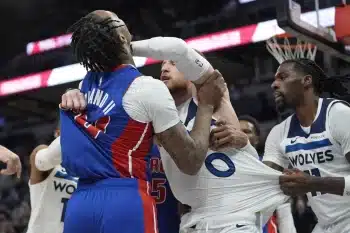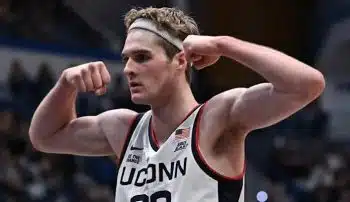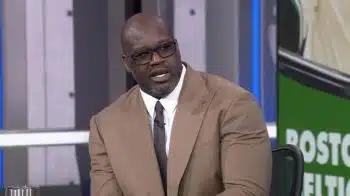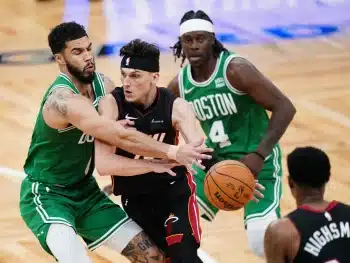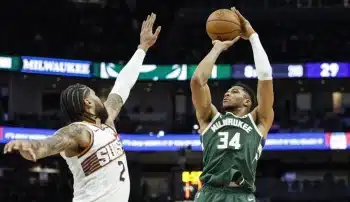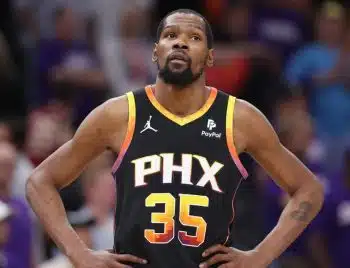NBA
NBA Daily: A Slow Start In Chicago, Part II
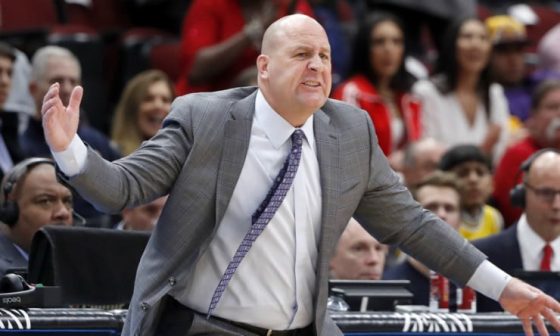
Earlier this week, we looked at the Bulls’ early-season offensive struggles.
Chicago has since played a back-to-back, taking on the Lakers at home before traveling to Atlanta yesterday. The team led by large margins throughout both games, but were only able to come away with a split after getting bulldozed by LA in the fourth quarter, 38-19. Encouragingly, they held onto a lead against the Hawks and enjoyed their first runaway victory of the year.
Now 3-6, the Bulls have a few days off before hosting James Harden and Russell Westbrook’s Houston Rockets on Saturday. There are positives – they hung with the West-leading Lakers for most of the game Tuesday. Lauri Markkanen showed signs of shaking off his rough start and Tomas Satoransky broke out against Atlanta. Boylen also tweaked his rotations last night, dropping the Satoransky-Kris Dunn-Ryan Arcidiacono lineup in favor of Zach LaVine-Satoransky-Arcidiacono, staggering starters so five bench guys weren’t in at once, and Luke Kornet stayed pat on the bench.
But the negatives are hard to ignore as well. The Laker meltdown was an addition to the list of games Chicago controlled but was unable to finish. The Hawks are, well, the Hawks – despite the buzzy start, Atlanta is just 3-4, and much of Trae Young’s problems last night were a product of missed shots rather than outstanding Chicago defense.
And that’s likely the biggest factor in Chicago’s slow start: defense. While the issues we’ve looked at haven’t been eliminated in a few days, there is some truth to the idea that eventually, the Bulls are going to make more shots. Defensively, however, there’s no positive regression. It’s there or it’s not, and it needs to be there every night. So far, it hasn’t been.
According to Cleaning the Glass, the Bulls are 15th in points allowed per 100 possessions at 107.3 (Up from 21st at the beginning of the week; small sample sizes!). They’ve been outrebounded in seven of nine games, are 26th in offensive rebounds allowed and 29th in overall rebounding. Worse, their defense takes a noticeable dive in the second half of games – their defensive rating is 98.3 in the first half vs. 114.4 in the second. That’s almost unbelievable.
The Bulls also are not forcing their opponents into many tough shots. Chicago is giving up 109.2 points per game. Of those points, 51.1 come in the paint, 32.7 come from three-point land, and 19 come at the free-throw line. That means that 102.8 of the 109.2 points they give up per game are coming from the most efficient places on the floor.
This defensive profile doesn’t bode well for their matchup this weekend with Houston, a team with one of the most lopsided shot distributions in the NBA.
The Bulls need to force opponents into mid-range shots and into more in-between areas if they plan on shoring up their defense. Allowing this many points in the best spots won’t translate to many wins.
There are stylistic concerns in how the Bulls have handled pick and rolls. They’ve more often than not blitzed the ball-handler, leaving the backline in a bind. Stephen Noh of did a great job detailing that over at The Athletic.
Perhaps most concerning, Boylen has implicitly blamed much of Chicago’s defensive issues on effort. He’s said that defensive breakdowns, “aren’t a fatigue thing,” and that substitutions have resulted in lapses in focus.
Checking in and out of the game shouldn’t result in an absence of concentration. Whether that’s the root of the problem is up for debate; what isn’t is that the Bulls’ poor defense thus far has been due to falling asleep off the ball, and just bad positioning in general.
You’re only down four here. This is still a basketball game. Otto Porter Jr. is stuck on LeBron James Island in the post. Not a great spot to be, but Porter is Chicago’s best wing defender. At this point, you play straight-up, one on one defense…or if help is sent, there has to be communication.
Carter stays in to help. He’s able to sag off of Dwight Howard, a non-shooter.
But what is LaVine doing? He’s in no-man’s land, and worse, has no clue where his man is. When LeBron makes his pass, LaVine drops to put a hand on Howard – something he wouldn’t have done if he knew Cook, a shooter, was behind him.
Cook nails the open jumper, and now you’re down three possessions.
This is a similar play, but shows the lack of awareness the Bulls have at times. Much of the damage has been done by now, but with 2:45 left, there’s still a glimmer of hope. Porter is again stranded on LeBron Island.
Again, not the best situation. But Wendell Carter, one of the few Bulls’ usually in the right spot, is way out of place. He’s guarding Anthony Davis the same way he did Howard, a recipe for disaster. There’s no reason to be that low, and helping from that angle is likely to be ineffective anyway. Instead of taking two steps out towards the wide-open Davis (or at the least telling LaVine to move out laterally), Carter randomly goes for a double…and does so on the bottom side with low hands, leaving LeBron’s vision unobstructed. He kicks to AD, who drills the uncontested three and, for all intents and purposes, ends the game.
These things can’t happen, especially in the fourth quarter.
The failures aren’t confined to the end of games, however. Here’s a play from the Atlanta game.
Chicago is up 17 and playing well after one quarter. Make the free throw, get back on defense. Instead of applying light pressure in the backcourt to slow the ball, Chicago gets tight.
Vince Carter zips a pass ahead, and because Chicago was essentially face-guarding Trae Young, he gets behind both Kris Dunn and Thaddeus Young. Chandler Hutchison is not guarding anyone, and Young gets a free run at the rim for an and-one.
There’s really no reason to allow this basket, and it only happened because the Bulls fell asleep. That’s the frustrating part: Chicago has the talent. This group has the athleticism and the all-around basketball IQ to play high-level defense. It shows in their performances in the first half of games.
But games are won in the second half, and they’re won with defense. As Boylen (hopefully) tightens his rotations, and the shots (hopefully) start to fall, the biggest area of improvement for Chicago has to be with its sense of urgency and concentration defensively – because continuing in this direction will lead to a long, long season.
